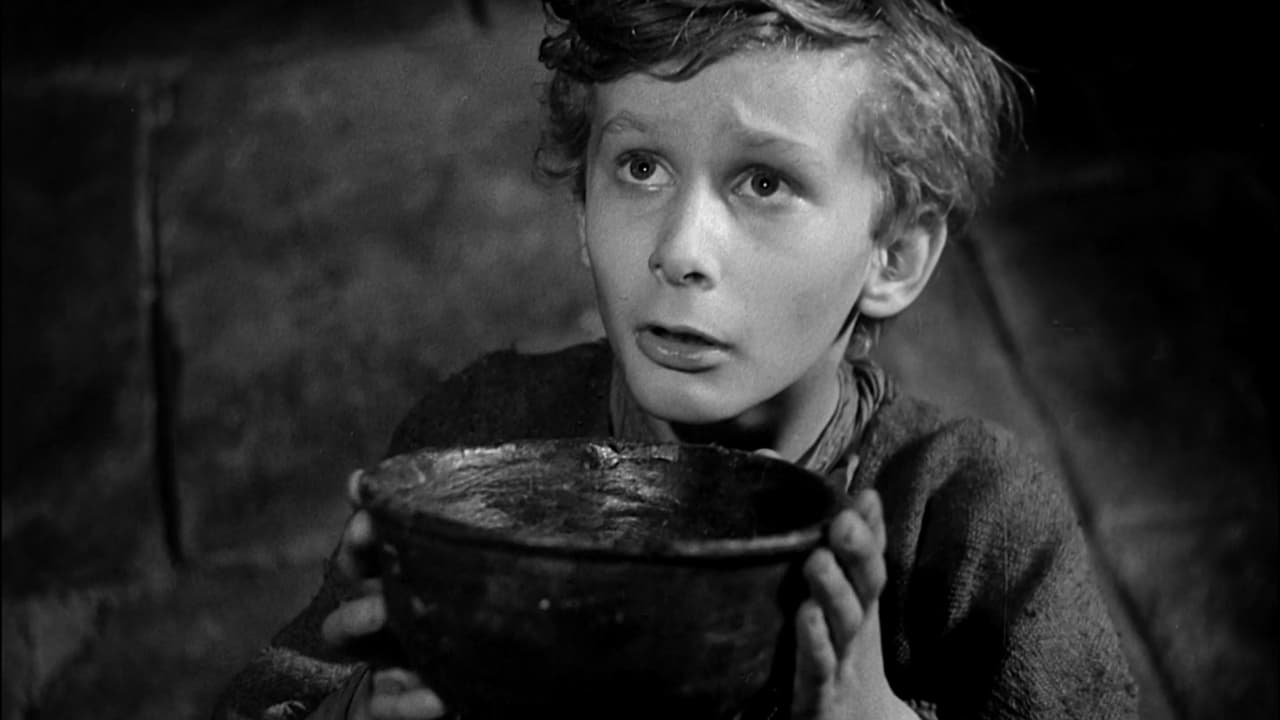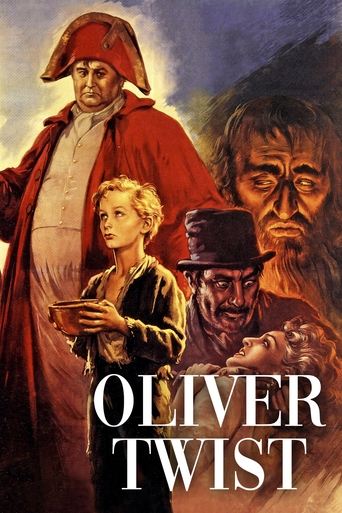IslandGuru
Who payed the critics
ChicRawIdol
A brilliant film that helped define a genre
FirstWitch
A movie that not only functions as a solid scarefest but a razor-sharp satire.
Hitchcoc
"Oliver Twist" has been done so many times, including versions in the last few years. I really enjoyed George C. Scott as Fagan, although the boy that played Oliver was hard to take. Then, of course, there's Ron Moody in the musical. What this one has is a period reality to Victorian England. So many of these previous efforts are so sanitized. Let's remember that this little boy was in a workhouse, probably infected with whatever was around, and at the mercy of people who had no love for him. Enter a passel of boys who are pickpockets, working for a thief who uses them. But what else does society offer them? Of course, they are going to be led by someone who can put a modicum of food in their stomachs and a roof over their heads. The bleakness of the times and the randomness of the world is at the center of this one. Not to mention stylings of David Lean, one of the greatest directors in history. It's hard to match this version of the Dickens classic.
Bill Slocum
"Oliver Twist" the novel rests at top of mind for the general public when it comes to Charles Dickens. Dickens wrote better novels, so why is "Oliver" so magisterial in his canon? Maybe I'm at fault for not liking the book more, but I suspect the answer has much to do with David Lean.Lean's adaptation of "Oliver Twist" is a textbook example of how a director can boil away the dross and bring out the core of a great story, adhering to the spirit of the author's intent but rediscovering it as a product of its place and time in a way that makes it timeless. The Expressionistic camera-work, its deep-focus lens pulling out details from a seemingly slapdash set, married to an unobtrusive yet penetrating score and a variety of brilliant character actors lending face and voice to a true group effort. It's like "Citizen Kane" meets Hogarth.When we first meet Oliver, he is inside his dying mother as she makes her painful way to a solitary light on a hill, a light that proves more ominous as she gets closer. Her painful journey is later made light of by one of Oliver's first enemies, a beadle named Bumble who sees her strength and bravery as exposing an animal nature that allows for his mistreatment of her son. "God Is Love" says the message on the brick wall of Oliver's workhouse, but there is no love for the boy in the first third of the film, a harrowing journey for any sensitive viewer to make.Francis L. Sullivan plays Bumble, an actor who gives the best performance in Lean's earlier Dickens movie, "Great Expectations." He's quite fine here playing quite a different role, both menacing and funny, but other actors make even deeper impressions.Alec Guinness gives his breakout performance here as Fagin, the crafty thief and seducer of virtue. Yes, Fagin as written by Dickens is also known as "the Jew," and with his big prosthetic nose Guinness plays with that stereotype more than a bit, but he also gets at the core of Dickens' villain by using that to accentuate his role as the consummate outsider, finding diabolical angles in a world where he is not welcome. Guinness was such a cerebral actor that it's hard to adjust to the feral nature of his performance here, except it makes the part and thus the movie.Fagin is a frightening villain, as is first-billed Robert Newton as the crazed Sikes, because we get the fear at the core of their villainy. Dickens wrote "Oliver Twist" not as adventure story but social exposé of his native London, a cruel city of dire poverty and no second chances. Seeing young Oliver (John Howard Davies) at its mercies is no easy thing, and we realize how Fagin and Sikes are products of that society. Watching them face a mob bent on their comeuppance is both thrilling and horrifying, because we know by then how cruel their world is.When the undertaker Sowerberry (Gibb McLaughlin) complains to Bumble early on about the small price given for his services to the workhouse, Bumble just smiles: "So are the coffins!" How he can smile at such a thing is harder to reckon than any of Fagin or Sikes' awful crimes.Being plunged into such a world, one wants for the relief Oliver first finds, than loses, with kindly Mr. Brownlow (Henry Stephenson). Much streamlining is called for here, and aptly done by Lean and co- screenwriter Stanley Haynes. Ditching a maudlin subplot involving a young woman Oliver befriends named Rose Maylie is a stroke of genius given how little she is missed. More problematic is the matter of Oliver's mysterious stalker, Mr. Monks, who does show up here but in a way that raises more questions than answers.Could Oliver have been better incorporated into the film's second half? Howard Davies does great with what he's given, and I for one wanted more. But I think what you do get is pretty classic in its own right, a finale that ranks up there with the best filmdom has ever offered.You will want to read the book after seeing the movie, if you haven't already. And you will likely admire it, as I do, for its humanity and bracing power. Still, for getting across both Dickens' story and its underlying social commentary, no one, not even Dickens himself, did as good a job as Lean and company do here.
MartinHafer
Aside from the wonderful musical "Oliver!", this is probably the best version of "Oliver Twist" you can find. "Oliver!" is a bit light-hearted--while this 1948 version is clearly more vivid in its portrayal of evil. Both are very well worth your time.As for the story, I won't bother recounting it--it's such a familiar story. Instead, I want to briefly focus on how it's different from some other versions. Although Oliver Twist is clearly the star of the film, this version de-emphasizes the boy--and focuses a lot more energy on the evil surrounding him--such as the Beadle and, more importantly, on the horrid Bill Sykes. You won't find a more vivid portrayal of Sykes (Robert Newton)--and at times it's a bit hard to watch the guy--it's very rough stuff for the time and even today. For instance, while the camera doesn't show all of his brutal beating he inflicts, it is loud and vicious--and the way the camera focuses on the panic-stricken dog is brilliant and VERY disturbing. It's also amazing to see Newton's face as he sits there looking at the corpse hours later--as if HE is horrified by his actions! You also see death in the eyes of the animal and in its body language--and is one of the most amazing scenes I can recall from the era. I wonder how they elicited that reaction...I sure hope they didn't do anything horrid to the dog to make it do that.Another portrait in evil that is quite good is Alec Guinness as Fagin. While you might not recognize him under all that makeup, it's him in one of his earliest films. An interesting note is that Israel banned the film for its antisemitic portrait, though at least unlike the original editions of "Oliver Twist" at least Fagin isn't constantly referred to as 'the Jew'! I really don't think the portrayal is, in itself, antisemitic BUT it does feed into a common stereotype of the era--of the wicked and money-hungry Jew. In fact, Dickens himself apparently came to regret how he described Fagin and de-emphasized this in later editions (removing most of the Jewish references). I would say that Guinness' character was less Jewish and more a subhuman troll! He is cruel and vicious--and little like the funny Fagin in "Oliver!".Apart from the VERY vivid portraits of evil, the biggest star of the film is the great cinematography. There are wonderful shots--with unusual angles and lighting. And, because of this, the film appears very similar to some American film noir pictures. Lovingly shot, that's for sure. Overall, a terrific picture--one of the best of the era. And, well worth seeing.
TheLittleSongbird
David Lean is a brilliant director, directing classics such as Lawrence of Arabia, Brief Encounter and Great Expectations. Oliver Twist is superior to all of these expect fot Lawrence of Arabia of course. Not only that, but this is definitely the best adaptation of the Charles Dickens book. I haven't seen the version yet with George C. Scott as Fagin, and although the Roman Polanski version was good, it felt bloated. I have one question, why isn't this in the top 250? I have no problem with Great Expectations and Brief Encounter being there, but this so deserves to be in the top 250 also, and I will dedicate the rest of this review to explain why. First of all, it had gorgeous cinematography, the beginning reminding me very much so of Great Expectations, with the howling wind and everything. The music was gorgeous and suited the film to perfection. But it was the quality of the acting and direction that made this film, Lean directing with his usual artistic flair and temperament, that make all his films so compelling. The best aspect of the film was the outstanding performance of Alec Guinness. I couldn't believe he was only 34 when he did this, you could never tell. Now this was condemned on release as anti-semitic, but Dickens is to be blamed for that, not Guinness, because Ron Moody in the musical had exactly the same criticism. Also, dickens was anti-semitic, and every one of his books conveyed the reality of living in the Victorian Era. Guinness's portrayal of Fagin was closest to that of Fagin in the book, oily, manipulative and somewhat charming. Ben Kingsley disappointed me, but I had no problem with Ron Moody in the musical. Speaking of the book, in the chapter "Fatal Consequences", Dickens likened Fagin to a predatory animal, and you'd think me a bit of a wimp, but Dicken's description of Fagin in that chapter frightened me a lot. Also Fagin is more of a villain than Sikes, because he manipulates Sikes into killing Nancy, knowing the extreme nature of his violence. Sikes says something like "I'll push a waggon over his head" and Fagin ironically says "You would" and deliberately doesn't tell Sikes that Nancy betrayed him, until Sikes swears he'll kill his betrayer, and when he says that, he means it. Anyway back on target. Guinness was also surrounded by ham Robert Newton as a genuinely frightening Bill Sikes, Kay Walsh as a more sympathetic Nancy (Nancy's death was brutal enough to make you cover your eyes, it was so brutal and what makes it more sad is that she offers Bill a way out, and Sikes shields his hand so he doesn't see what's he's done)and newcomer John Howard Davies as Oliver, plus if there was an Oscar for animals the dog should've got one. All in all, a magnificent film, that is a 10/10 from me. Bethany Cox.

